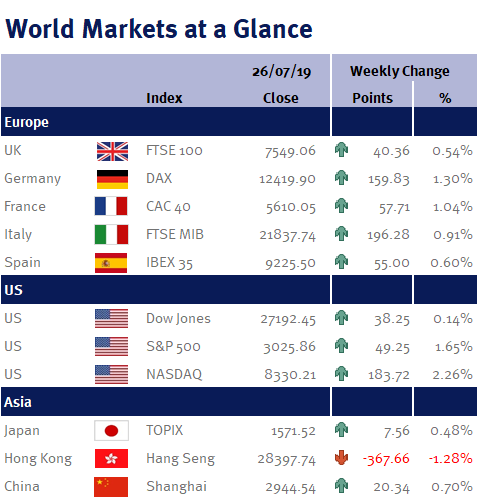UK Media has been dominated by the change in government this week, however, the developments had little bearing on global equity market direction as investors were focused on the ECB’s monetary policy announcement and US economic data. Nevertheless, UK politics deserve a mention as it sets the stage for the coming months.
Week ending 26th July 2019.
29th July 2019

As expected, Boris Johnson was elected to lead the Conservative Party and replaced Theresa May as the UK’s Prime Minister. One of his first priorities was to form a cabinet which saw him replace 18 of the 29 ministers. Notable appointments included Sajid Javid as Chancellor of the Exchequer, Priti Patel as Home Secretary and Dominic Raab as the new Foreign Secretary. Boris also tasked Michael Gove with ramping up no-deal Brexit preparations, which coupled with a much more pro-Brexit cabinet raised concerns of a no-deal Brexit and saw the pound close at a two year low versus the US Dollar. UK Politics will no doubt continue to grab headlines over the coming weeks as Boris settles into his new role and attempts to deliver Brexit one way or another.
In Europe this week, French and German manufacturing PMI data fell short of expectations and a key measure of German business sentiment (IFO business climate index) reached a six year low. In the wake of disappointing forward-looking economic data, the ECB left monetary policy unchanged which weighed on European equity markets and also saw the Euro hit a two year low versus the US Dollar.
Whilst the ECBs decision may have disappointed some investors, the statement from the ECB guided to “interest rates being at their current level or even lower until the middle of 2020”. The addition of “or even lower until the middle of 2020” leaves open the prospect that the ECB will ease monetary policy at their next meeting. Additionally, during the press conference, the ECB President Mario Draghi made several dovish remarks further bolstering expectations of a policy response in September.
US GDP for the second quarter of 2019 came in at 2.1% on an annualised basis, beating expectations of 1.8% thanks to stronger than anticipated consumer and government spending. Whilst growth beat expectations, exports and inventories were down, and business investment fell for the first time in three years. With trade tensions evidently weighing on the economy, investors remained optimistic that the Fed will cut interest rates next week, despite headline GDP beating consensus forecasts.
The Fed announces monetary policy next week and is expected to cut interest rates for the first time in over a decade by 0.25%-0.50%, investors will certainly be disappointed if the Fed fails to act. In addition to the US, next week the UK and Japan will provide updates on their monetary policy and trade talks between the US and China are set to resume. The last couple of weeks have been busy with companies across the globe announcing their half year results and that continues next week, with many big names updating investors on their performance.
Peter Quayle, Fund Manager
The latest market updates are brought to you by Investment Managers & Analysts at Wealth at Work Limited which is a member of the Wealth at Work group of companies.
Links to websites external to those of Wealth at Work Limited (also referred to here as 'we', 'us', 'our' 'ours') will usually contain some content that is not written by us and over which we have no authority and which we do not endorse. Any hyperlinks or references to third party websites are provided for your convenience only. Therefore please be aware that we do not accept responsibility for the content of any third party site(s) except content that is specifically attributed to us or our employees and where we are the authors of such content. Further, we accept no responsibility for any malicious codes (or their consequences) of external sites. Nor do we endorse any organisation or publication to which we link and make no representations about them.

